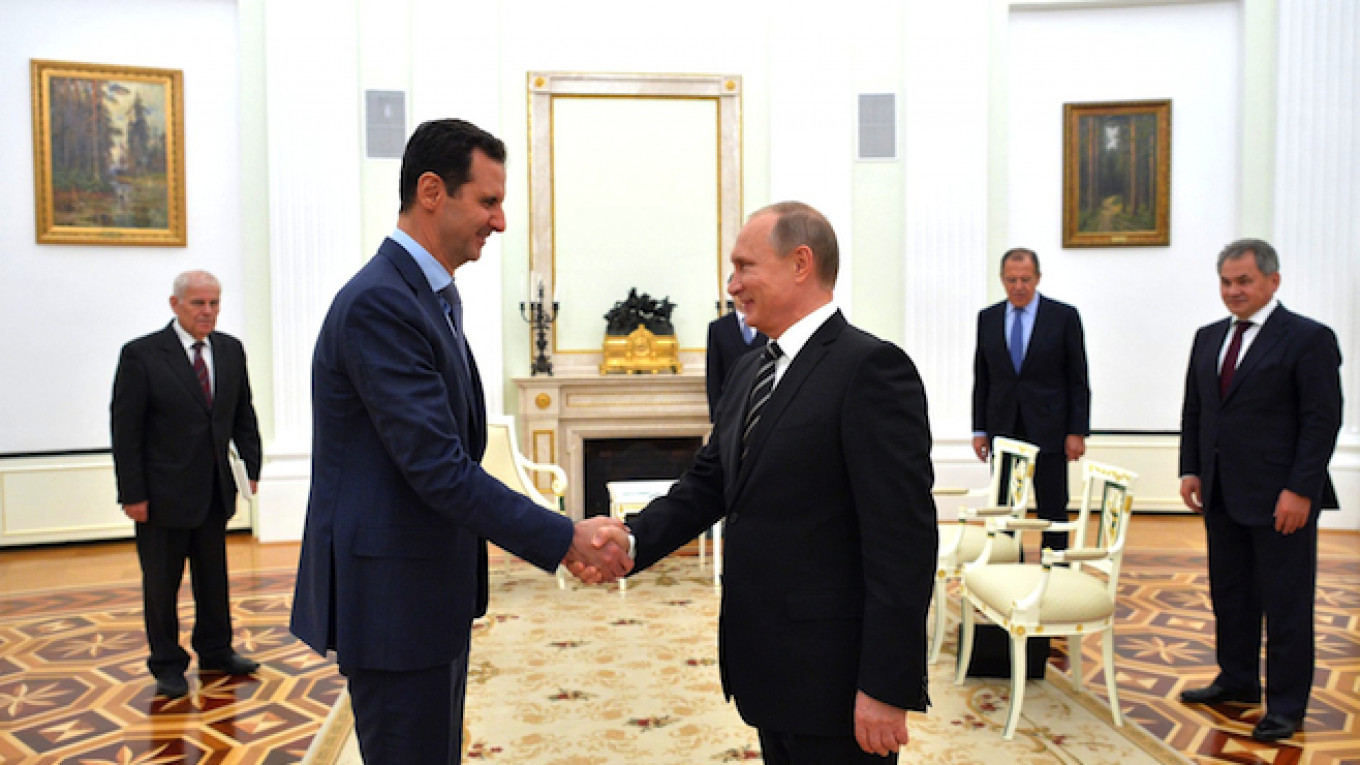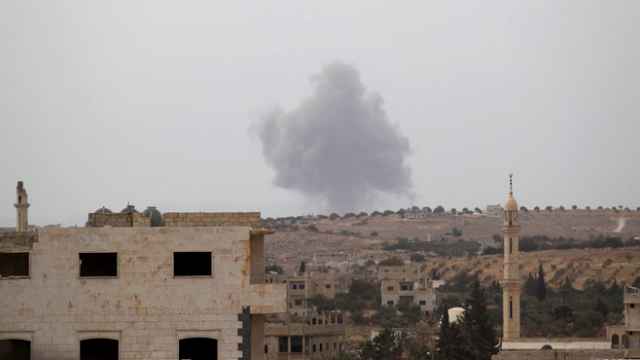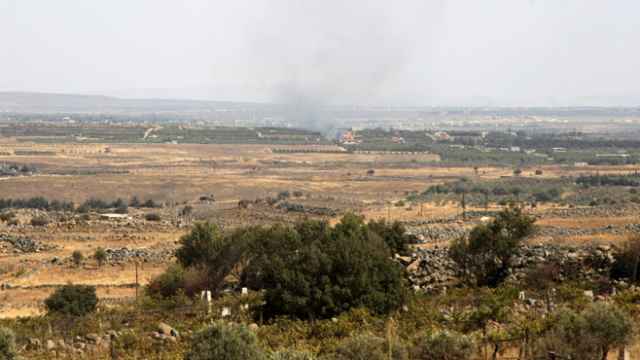In his first known foreign trip since the Syrian civil war began in 2011, President Bashar Assad made a surprise appearance in Moscow on Tuesday night to meet with President Vladimir Putin and an entourage of senior government ministers.
Putin demonstrated his support for Assad, a longstanding Russian ally, on Sept. 30 when, after a rapid military buildup at two bases in Syria, Russia began air strikes on opposition targets in the country.
See the photo gallery: Syria's Assad Meets With President Putin in Moscow
“Despite the dramatic situation in your country, you have responded to our request and come here to Russia,” Putin told Assad, according to an English-language transcript of the meeting published on the Kremlin's website Wednesday.
Assad met with Putin, Prime Minister Dmitry Medvedev, Foreign Minister Sergei Lavrov and Defense Ministry Sergei Shoigu at the Kremlin to discuss his own and Syria's future, more than four years into a bloody civil war.
“Our position is that positive results in military operations will lay the base for then working out a long-term settlement based on a political process that involves all political forces, ethnic and religious groups,” Putin said.
Assad, for his part, thanked Russia “for supporting Syria's unity and independence,” and for working “within the framework of international law” — reflecting the Kremlin's position that Russia's military intervention has greater legitimacy that the U.S.-led coalition operation, since the Syrian government requested Moscow to act.
An unidentified Syrian official told The Associated Press on Wednesday that Assad's stay in Moscow was brief, and that he returned to Damascus the same day. The visit will be followed up by a Russian parliamentary delegation visit to Syria on Thursday.
Later, a Syrian presidential administration statement posted on Facebook said Assad took part in three meetings in Moscow: one with Putin, Shoigu and Lavrov; a closed meeting with Putin; and a working dinner.
“It's a rare occasion that all major policy-makers greet a foreign politician,” said Yury Barmin, a Russian military and political analyst focusing on the Middle East.
The Kremlin clearly wanted to broadcast the meeting to the world, he said: “This is very telling in terms of Moscow's strategy in Syria. Russia could have well have kept this visit secret.”
Russian Operation Continues
Russia's military operation has been presented to the Russian public and the international community as an anti-terrorist operation. In daily statements posted on Facebook, the Defense Ministry claims to be hitting Islamic State militants operating in Syria.
However, since the start of the Russian campaign — which has so far been limited to air sorties — Western officials have repeatedly insisted that Russia was targeting an array of groups fighting Assad's regime, including the so-called moderate opposition, which has been supported by the U.S.
In this role, Russia's air force has claimed early success. After several days of heavy air strikes last week, the Defense Ministry said it was scaling back operations to assess the changing battlefield after opposition forces were said to be in retreat.
The campaign has not been without costs to Russia, however, according to Reuters. On Tuesday, the news agency cited a senior Syrian official as saying three Russians had died in Syria fighting alongside government forces.
These claims were denied by Russian officials later Tuesday. A Russian Defense Ministry spokesman said on Tuesday that “there have been no casualties among Russian military servicemen in Syria,” the state-run TASS news agency reported.
According to Barmin, the timing of Assad's visit to Moscow suggests that not only are the two nation's coordinating their diplomatic efforts, but Assad may have requested additional Russian material support.
Political Settlement?
Assad, according to the Kremlin's transcript of the meeting, said Russia's actions “made it possible to prevent events in Syria from taking an even more tragic turn.”
“If it were not for [Russia's] actions and decisions, the terrorism that is spreading through the region now would have made even greater gains and spread to even wider territories,” he said, characterizing Russia's military operations as part of a broader “common front” against terrorism.
“Military strikes against the terrorists are essential above all because we must fight terrorism, and also because terrorism is a real obstacle on the road to reaching a political settlement,” Assad said. He also stressed that political steps must follow military action.
Dr. Theodore Karasik, from geopolitical consultants Gulf State Analytics, said that by traveling to Moscow, Assad was laying the ground for his family's survival as Russia's political and military campaign in Syria continues.
“Survival here means more than fighting and destroying extremists and a political transition. It has to do with what appears to be a coalescing of foreign voices on determining Syria's future,” Karasik said.”
Though the U.S. and Russia have yet to come to terms over the future of Assad — the West wants to see him removed from power — the two sides have been working to find common ground.
Later on Wednesday, the Russian Foreign Ministry announced that Lavrov would travel to Vienna to meet with U.S. Secretary of State John Kerry to discuss the situation in Syria, The Associated Press reported.
“The West should see [Assad's] visit as a positive development, but that may be unlikely given the multitude of voices and views. [But], the Kremlin is controlling the negotiation process,” he said, adding that “Russia is in Syria for the long haul.”
Contact the author at [email protected]
A Message from The Moscow Times:
Dear readers,
We are facing unprecedented challenges. Russia's Prosecutor General's Office has designated The Moscow Times as an "undesirable" organization, criminalizing our work and putting our staff at risk of prosecution. This follows our earlier unjust labeling as a "foreign agent."
These actions are direct attempts to silence independent journalism in Russia. The authorities claim our work "discredits the decisions of the Russian leadership." We see things differently: we strive to provide accurate, unbiased reporting on Russia.
We, the journalists of The Moscow Times, refuse to be silenced. But to continue our work, we need your help.
Your support, no matter how small, makes a world of difference. If you can, please support us monthly starting from just $2. It's quick to set up, and every contribution makes a significant impact.
By supporting The Moscow Times, you're defending open, independent journalism in the face of repression. Thank you for standing with us.
Remind me later.






